ACU NRSG370: Palliative Care Case Study of Mr. Patrick Brady
VerifiedAdded on 2022/09/28
|10
|2774
|34
Case Study
AI Summary
This case study focuses on Mr. Patrick Brady, a 70-year-old male with end-stage prostatic cancer and bone metastasis, requiring palliative care. The assessment utilizes the clinical reasoning cycle to address his needs. The case study begins with an introduction to palliative care and the patient's situation, detailing his medical history, symptoms (including chronic pain, nutritional deficits, and emotional distress), and decision to cease curative treatments. The study then collects and processes information, identifying three primary nursing problems: chronic pain, nutritional deficit, and the need for emotional and spiritual support. Goals are established to alleviate suffering, and nursing interventions are proposed for each problem, including pain management, nutritional support, and emotional/spiritual care. The effectiveness of interventions is evaluated, and reflection on the learning experience is provided. Ethical, legal, evidence-based, and person-centered care are emphasized throughout, with references to support the strategies used. The assignment highlights the importance of holistic palliative nursing care, especially in end-of-life scenarios.
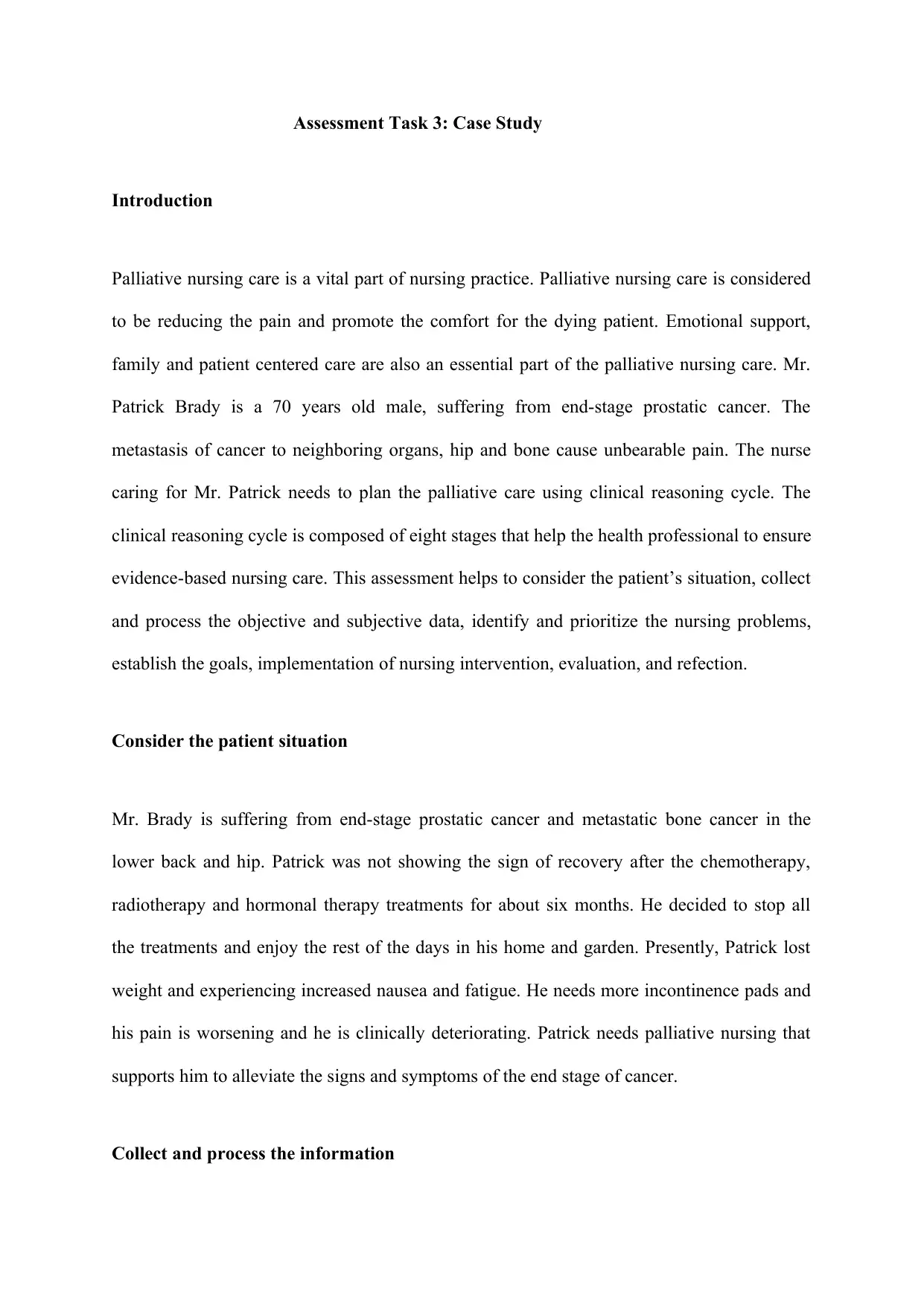
Assessment Task 3: Case Study
Introduction
Palliative nursing care is a vital part of nursing practice. Palliative nursing care is considered
to be reducing the pain and promote the comfort for the dying patient. Emotional support,
family and patient centered care are also an essential part of the palliative nursing care. Mr.
Patrick Brady is a 70 years old male, suffering from end-stage prostatic cancer. The
metastasis of cancer to neighboring organs, hip and bone cause unbearable pain. The nurse
caring for Mr. Patrick needs to plan the palliative care using clinical reasoning cycle. The
clinical reasoning cycle is composed of eight stages that help the health professional to ensure
evidence-based nursing care. This assessment helps to consider the patient’s situation, collect
and process the objective and subjective data, identify and prioritize the nursing problems,
establish the goals, implementation of nursing intervention, evaluation, and refection.
Consider the patient situation
Mr. Brady is suffering from end-stage prostatic cancer and metastatic bone cancer in the
lower back and hip. Patrick was not showing the sign of recovery after the chemotherapy,
radiotherapy and hormonal therapy treatments for about six months. He decided to stop all
the treatments and enjoy the rest of the days in his home and garden. Presently, Patrick lost
weight and experiencing increased nausea and fatigue. He needs more incontinence pads and
his pain is worsening and he is clinically deteriorating. Patrick needs palliative nursing that
supports him to alleviate the signs and symptoms of the end stage of cancer.
Collect and process the information
Introduction
Palliative nursing care is a vital part of nursing practice. Palliative nursing care is considered
to be reducing the pain and promote the comfort for the dying patient. Emotional support,
family and patient centered care are also an essential part of the palliative nursing care. Mr.
Patrick Brady is a 70 years old male, suffering from end-stage prostatic cancer. The
metastasis of cancer to neighboring organs, hip and bone cause unbearable pain. The nurse
caring for Mr. Patrick needs to plan the palliative care using clinical reasoning cycle. The
clinical reasoning cycle is composed of eight stages that help the health professional to ensure
evidence-based nursing care. This assessment helps to consider the patient’s situation, collect
and process the objective and subjective data, identify and prioritize the nursing problems,
establish the goals, implementation of nursing intervention, evaluation, and refection.
Consider the patient situation
Mr. Brady is suffering from end-stage prostatic cancer and metastatic bone cancer in the
lower back and hip. Patrick was not showing the sign of recovery after the chemotherapy,
radiotherapy and hormonal therapy treatments for about six months. He decided to stop all
the treatments and enjoy the rest of the days in his home and garden. Presently, Patrick lost
weight and experiencing increased nausea and fatigue. He needs more incontinence pads and
his pain is worsening and he is clinically deteriorating. Patrick needs palliative nursing that
supports him to alleviate the signs and symptoms of the end stage of cancer.
Collect and process the information
Paraphrase This Document
Need a fresh take? Get an instant paraphrase of this document with our AI Paraphraser
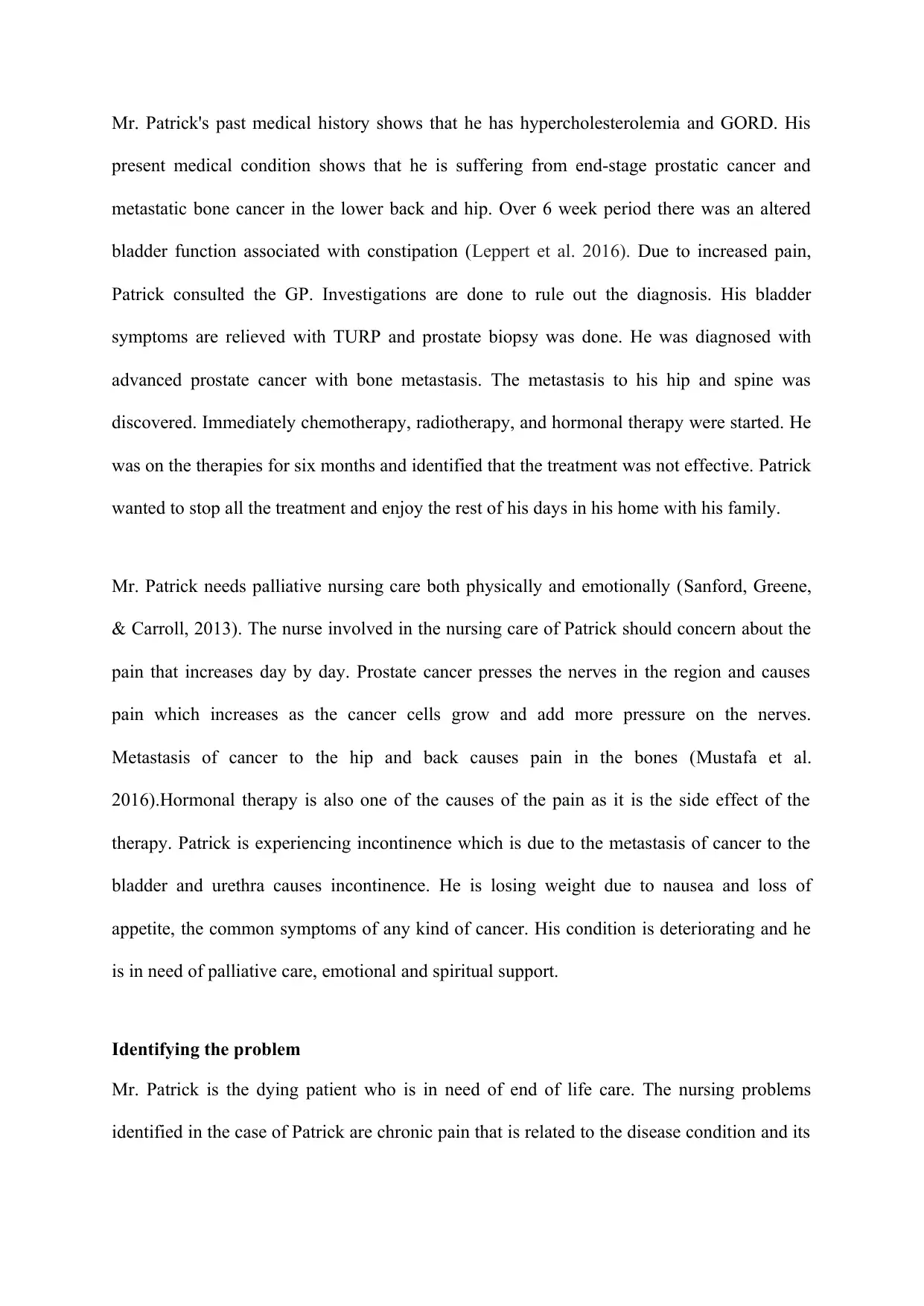
Mr. Patrick's past medical history shows that he has hypercholesterolemia and GORD. His
present medical condition shows that he is suffering from end-stage prostatic cancer and
metastatic bone cancer in the lower back and hip. Over 6 week period there was an altered
bladder function associated with constipation (Leppert et al. 2016). Due to increased pain,
Patrick consulted the GP. Investigations are done to rule out the diagnosis. His bladder
symptoms are relieved with TURP and prostate biopsy was done. He was diagnosed with
advanced prostate cancer with bone metastasis. The metastasis to his hip and spine was
discovered. Immediately chemotherapy, radiotherapy, and hormonal therapy were started. He
was on the therapies for six months and identified that the treatment was not effective. Patrick
wanted to stop all the treatment and enjoy the rest of his days in his home with his family.
Mr. Patrick needs palliative nursing care both physically and emotionally (Sanford, Greene,
& Carroll, 2013). The nurse involved in the nursing care of Patrick should concern about the
pain that increases day by day. Prostate cancer presses the nerves in the region and causes
pain which increases as the cancer cells grow and add more pressure on the nerves.
Metastasis of cancer to the hip and back causes pain in the bones (Mustafa et al.
2016).Hormonal therapy is also one of the causes of the pain as it is the side effect of the
therapy. Patrick is experiencing incontinence which is due to the metastasis of cancer to the
bladder and urethra causes incontinence. He is losing weight due to nausea and loss of
appetite, the common symptoms of any kind of cancer. His condition is deteriorating and he
is in need of palliative care, emotional and spiritual support.
Identifying the problem
Mr. Patrick is the dying patient who is in need of end of life care. The nursing problems
identified in the case of Patrick are chronic pain that is related to the disease condition and its
present medical condition shows that he is suffering from end-stage prostatic cancer and
metastatic bone cancer in the lower back and hip. Over 6 week period there was an altered
bladder function associated with constipation (Leppert et al. 2016). Due to increased pain,
Patrick consulted the GP. Investigations are done to rule out the diagnosis. His bladder
symptoms are relieved with TURP and prostate biopsy was done. He was diagnosed with
advanced prostate cancer with bone metastasis. The metastasis to his hip and spine was
discovered. Immediately chemotherapy, radiotherapy, and hormonal therapy were started. He
was on the therapies for six months and identified that the treatment was not effective. Patrick
wanted to stop all the treatment and enjoy the rest of his days in his home with his family.
Mr. Patrick needs palliative nursing care both physically and emotionally (Sanford, Greene,
& Carroll, 2013). The nurse involved in the nursing care of Patrick should concern about the
pain that increases day by day. Prostate cancer presses the nerves in the region and causes
pain which increases as the cancer cells grow and add more pressure on the nerves.
Metastasis of cancer to the hip and back causes pain in the bones (Mustafa et al.
2016).Hormonal therapy is also one of the causes of the pain as it is the side effect of the
therapy. Patrick is experiencing incontinence which is due to the metastasis of cancer to the
bladder and urethra causes incontinence. He is losing weight due to nausea and loss of
appetite, the common symptoms of any kind of cancer. His condition is deteriorating and he
is in need of palliative care, emotional and spiritual support.
Identifying the problem
Mr. Patrick is the dying patient who is in need of end of life care. The nursing problems
identified in the case of Patrick are chronic pain that is related to the disease condition and its
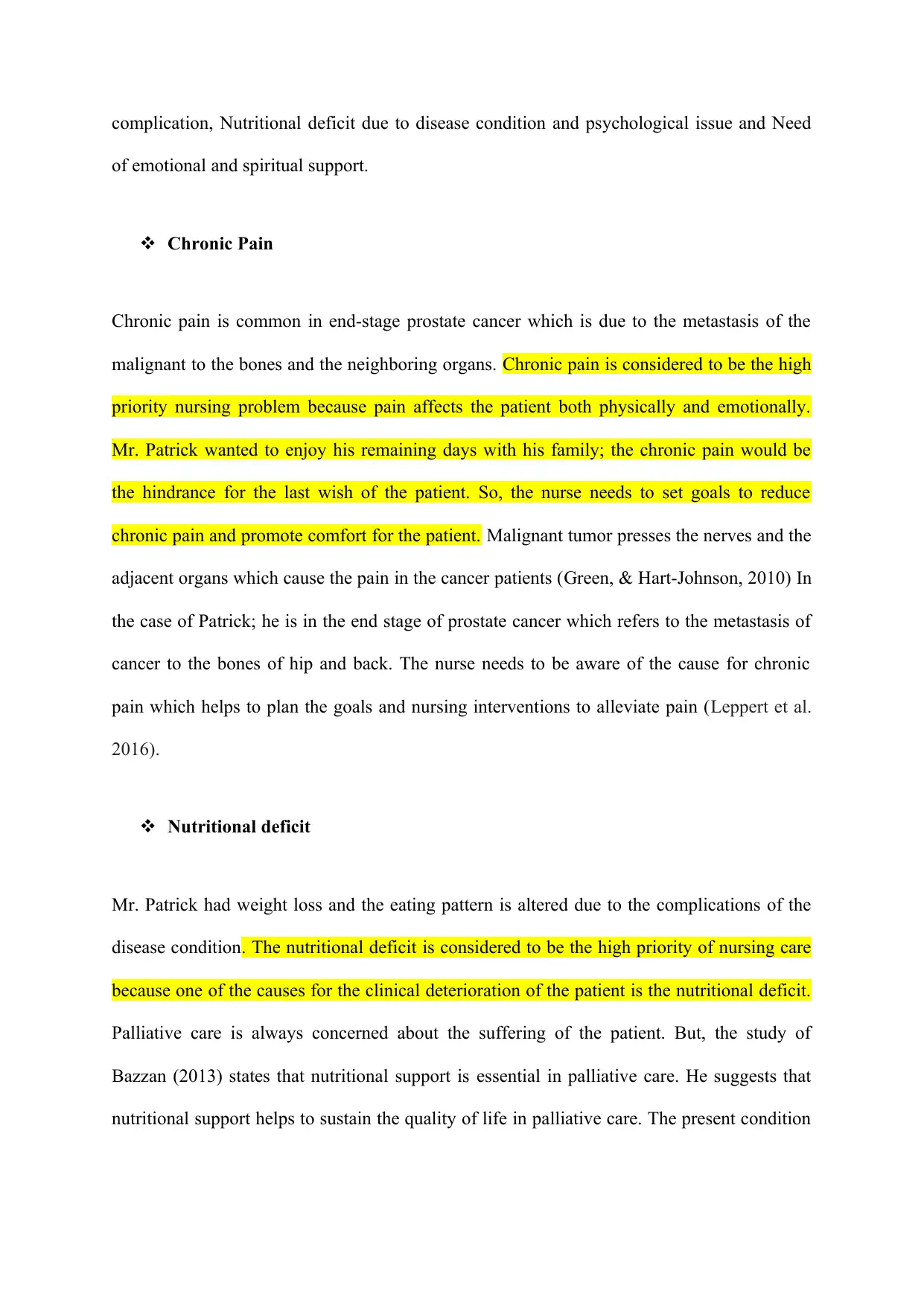
complication, Nutritional deficit due to disease condition and psychological issue and Need
of emotional and spiritual support.
Chronic Pain
Chronic pain is common in end-stage prostate cancer which is due to the metastasis of the
malignant to the bones and the neighboring organs. Chronic pain is considered to be the high
priority nursing problem because pain affects the patient both physically and emotionally.
Mr. Patrick wanted to enjoy his remaining days with his family; the chronic pain would be
the hindrance for the last wish of the patient. So, the nurse needs to set goals to reduce
chronic pain and promote comfort for the patient. Malignant tumor presses the nerves and the
adjacent organs which cause the pain in the cancer patients (Green, & Hart-Johnson, 2010) In
the case of Patrick; he is in the end stage of prostate cancer which refers to the metastasis of
cancer to the bones of hip and back. The nurse needs to be aware of the cause for chronic
pain which helps to plan the goals and nursing interventions to alleviate pain (Leppert et al.
2016).
Nutritional deficit
Mr. Patrick had weight loss and the eating pattern is altered due to the complications of the
disease condition. The nutritional deficit is considered to be the high priority of nursing care
because one of the causes for the clinical deterioration of the patient is the nutritional deficit.
Palliative care is always concerned about the suffering of the patient. But, the study of
Bazzan (2013) states that nutritional support is essential in palliative care. He suggests that
nutritional support helps to sustain the quality of life in palliative care. The present condition
of emotional and spiritual support.
Chronic Pain
Chronic pain is common in end-stage prostate cancer which is due to the metastasis of the
malignant to the bones and the neighboring organs. Chronic pain is considered to be the high
priority nursing problem because pain affects the patient both physically and emotionally.
Mr. Patrick wanted to enjoy his remaining days with his family; the chronic pain would be
the hindrance for the last wish of the patient. So, the nurse needs to set goals to reduce
chronic pain and promote comfort for the patient. Malignant tumor presses the nerves and the
adjacent organs which cause the pain in the cancer patients (Green, & Hart-Johnson, 2010) In
the case of Patrick; he is in the end stage of prostate cancer which refers to the metastasis of
cancer to the bones of hip and back. The nurse needs to be aware of the cause for chronic
pain which helps to plan the goals and nursing interventions to alleviate pain (Leppert et al.
2016).
Nutritional deficit
Mr. Patrick had weight loss and the eating pattern is altered due to the complications of the
disease condition. The nutritional deficit is considered to be the high priority of nursing care
because one of the causes for the clinical deterioration of the patient is the nutritional deficit.
Palliative care is always concerned about the suffering of the patient. But, the study of
Bazzan (2013) states that nutritional support is essential in palliative care. He suggests that
nutritional support helps to sustain the quality of life in palliative care. The present condition
⊘ This is a preview!⊘
Do you want full access?
Subscribe today to unlock all pages.

Trusted by 1+ million students worldwide
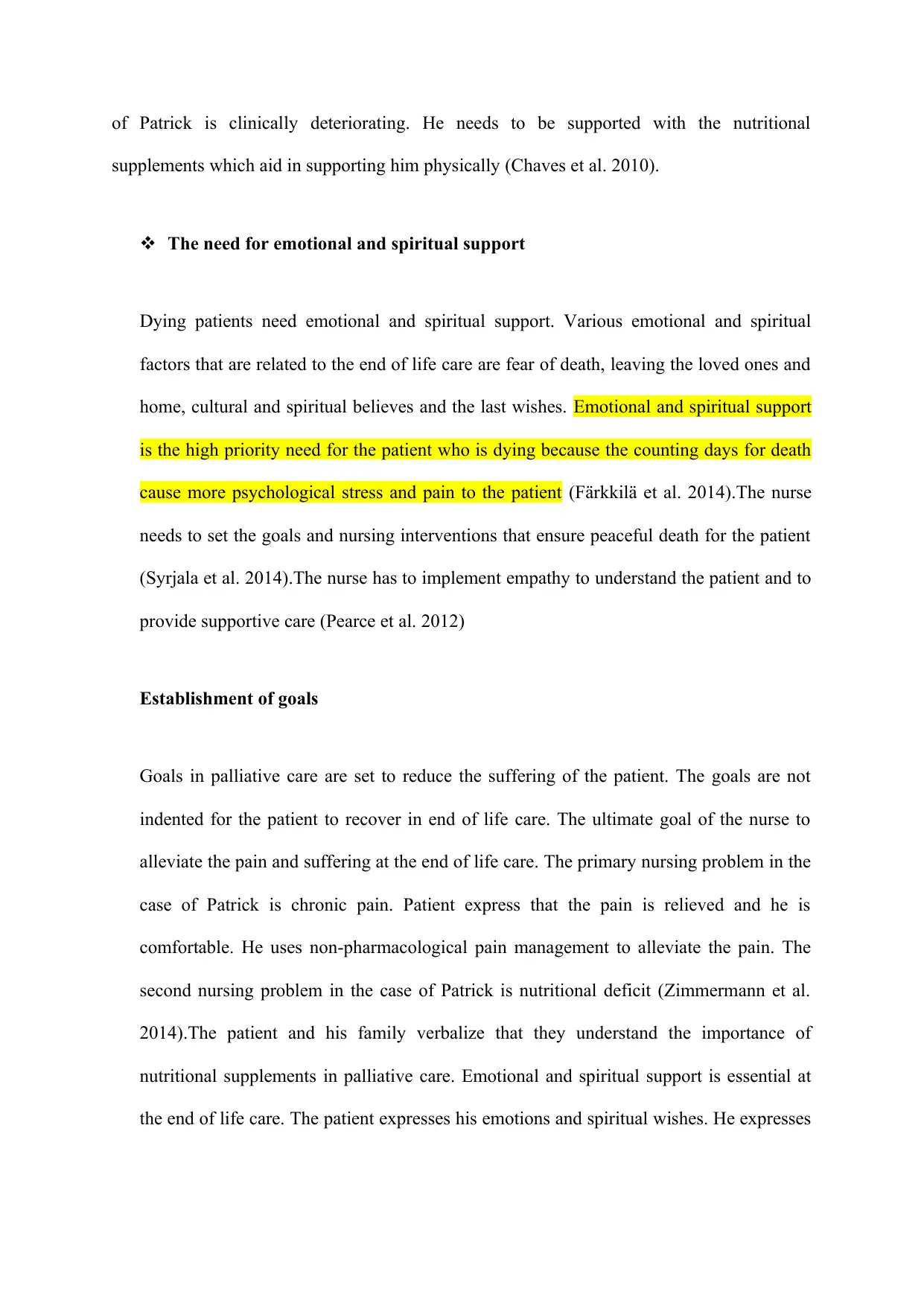
of Patrick is clinically deteriorating. He needs to be supported with the nutritional
supplements which aid in supporting him physically (Chaves et al. 2010).
The need for emotional and spiritual support
Dying patients need emotional and spiritual support. Various emotional and spiritual
factors that are related to the end of life care are fear of death, leaving the loved ones and
home, cultural and spiritual believes and the last wishes. Emotional and spiritual support
is the high priority need for the patient who is dying because the counting days for death
cause more psychological stress and pain to the patient (Färkkilä et al. 2014).The nurse
needs to set the goals and nursing interventions that ensure peaceful death for the patient
(Syrjala et al. 2014).The nurse has to implement empathy to understand the patient and to
provide supportive care (Pearce et al. 2012)
Establishment of goals
Goals in palliative care are set to reduce the suffering of the patient. The goals are not
indented for the patient to recover in end of life care. The ultimate goal of the nurse to
alleviate the pain and suffering at the end of life care. The primary nursing problem in the
case of Patrick is chronic pain. Patient express that the pain is relieved and he is
comfortable. He uses non-pharmacological pain management to alleviate the pain. The
second nursing problem in the case of Patrick is nutritional deficit (Zimmermann et al.
2014).The patient and his family verbalize that they understand the importance of
nutritional supplements in palliative care. Emotional and spiritual support is essential at
the end of life care. The patient expresses his emotions and spiritual wishes. He expresses
supplements which aid in supporting him physically (Chaves et al. 2010).
The need for emotional and spiritual support
Dying patients need emotional and spiritual support. Various emotional and spiritual
factors that are related to the end of life care are fear of death, leaving the loved ones and
home, cultural and spiritual believes and the last wishes. Emotional and spiritual support
is the high priority need for the patient who is dying because the counting days for death
cause more psychological stress and pain to the patient (Färkkilä et al. 2014).The nurse
needs to set the goals and nursing interventions that ensure peaceful death for the patient
(Syrjala et al. 2014).The nurse has to implement empathy to understand the patient and to
provide supportive care (Pearce et al. 2012)
Establishment of goals
Goals in palliative care are set to reduce the suffering of the patient. The goals are not
indented for the patient to recover in end of life care. The ultimate goal of the nurse to
alleviate the pain and suffering at the end of life care. The primary nursing problem in the
case of Patrick is chronic pain. Patient express that the pain is relieved and he is
comfortable. He uses non-pharmacological pain management to alleviate the pain. The
second nursing problem in the case of Patrick is nutritional deficit (Zimmermann et al.
2014).The patient and his family verbalize that they understand the importance of
nutritional supplements in palliative care. Emotional and spiritual support is essential at
the end of life care. The patient expresses his emotions and spiritual wishes. He expresses
Paraphrase This Document
Need a fresh take? Get an instant paraphrase of this document with our AI Paraphraser
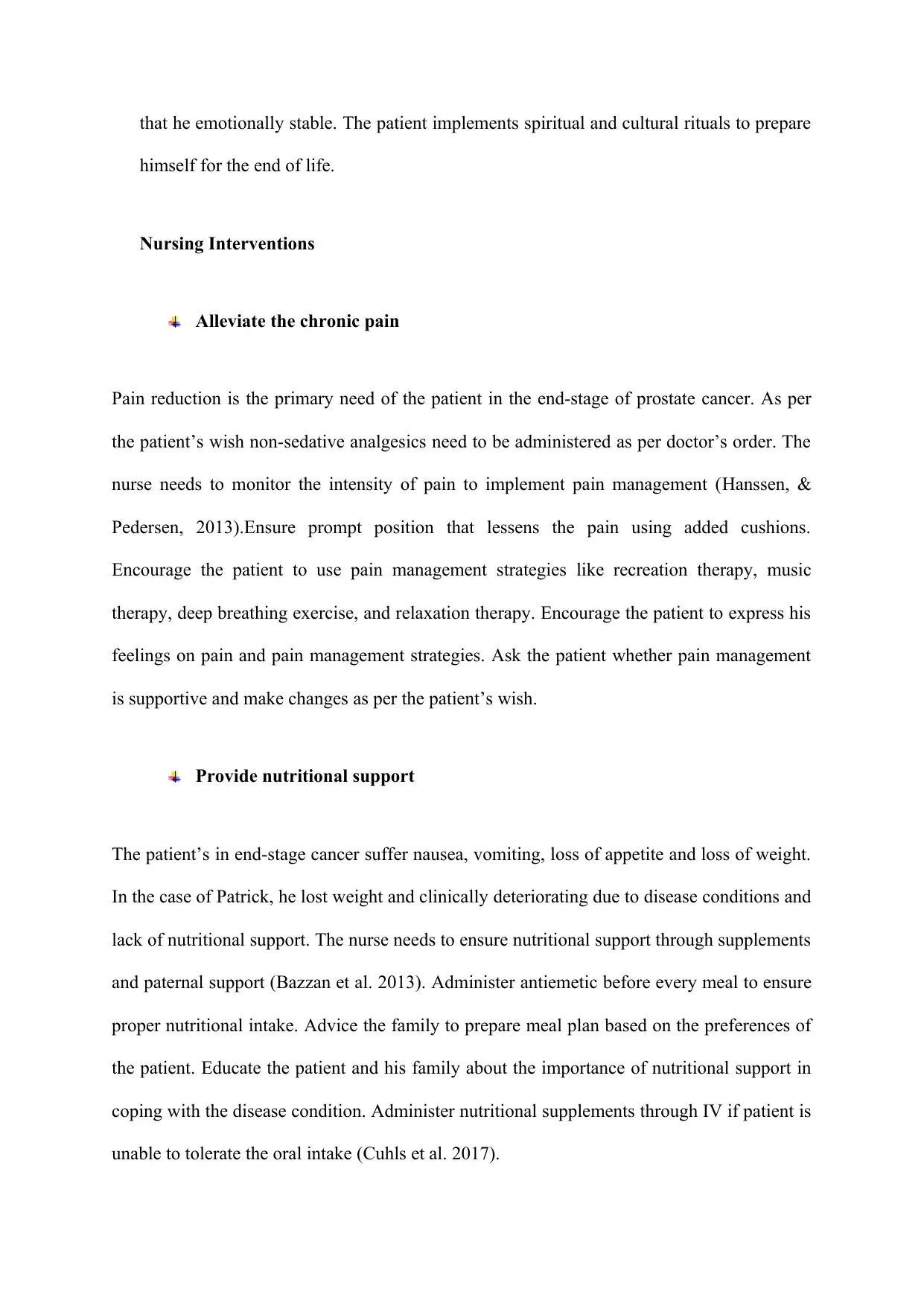
that he emotionally stable. The patient implements spiritual and cultural rituals to prepare
himself for the end of life.
Nursing Interventions
Alleviate the chronic pain
Pain reduction is the primary need of the patient in the end-stage of prostate cancer. As per
the patient’s wish non-sedative analgesics need to be administered as per doctor’s order. The
nurse needs to monitor the intensity of pain to implement pain management (Hanssen, &
Pedersen, 2013).Ensure prompt position that lessens the pain using added cushions.
Encourage the patient to use pain management strategies like recreation therapy, music
therapy, deep breathing exercise, and relaxation therapy. Encourage the patient to express his
feelings on pain and pain management strategies. Ask the patient whether pain management
is supportive and make changes as per the patient’s wish.
Provide nutritional support
The patient’s in end-stage cancer suffer nausea, vomiting, loss of appetite and loss of weight.
In the case of Patrick, he lost weight and clinically deteriorating due to disease conditions and
lack of nutritional support. The nurse needs to ensure nutritional support through supplements
and paternal support (Bazzan et al. 2013). Administer antiemetic before every meal to ensure
proper nutritional intake. Advice the family to prepare meal plan based on the preferences of
the patient. Educate the patient and his family about the importance of nutritional support in
coping with the disease condition. Administer nutritional supplements through IV if patient is
unable to tolerate the oral intake (Cuhls et al. 2017).
himself for the end of life.
Nursing Interventions
Alleviate the chronic pain
Pain reduction is the primary need of the patient in the end-stage of prostate cancer. As per
the patient’s wish non-sedative analgesics need to be administered as per doctor’s order. The
nurse needs to monitor the intensity of pain to implement pain management (Hanssen, &
Pedersen, 2013).Ensure prompt position that lessens the pain using added cushions.
Encourage the patient to use pain management strategies like recreation therapy, music
therapy, deep breathing exercise, and relaxation therapy. Encourage the patient to express his
feelings on pain and pain management strategies. Ask the patient whether pain management
is supportive and make changes as per the patient’s wish.
Provide nutritional support
The patient’s in end-stage cancer suffer nausea, vomiting, loss of appetite and loss of weight.
In the case of Patrick, he lost weight and clinically deteriorating due to disease conditions and
lack of nutritional support. The nurse needs to ensure nutritional support through supplements
and paternal support (Bazzan et al. 2013). Administer antiemetic before every meal to ensure
proper nutritional intake. Advice the family to prepare meal plan based on the preferences of
the patient. Educate the patient and his family about the importance of nutritional support in
coping with the disease condition. Administer nutritional supplements through IV if patient is
unable to tolerate the oral intake (Cuhls et al. 2017).
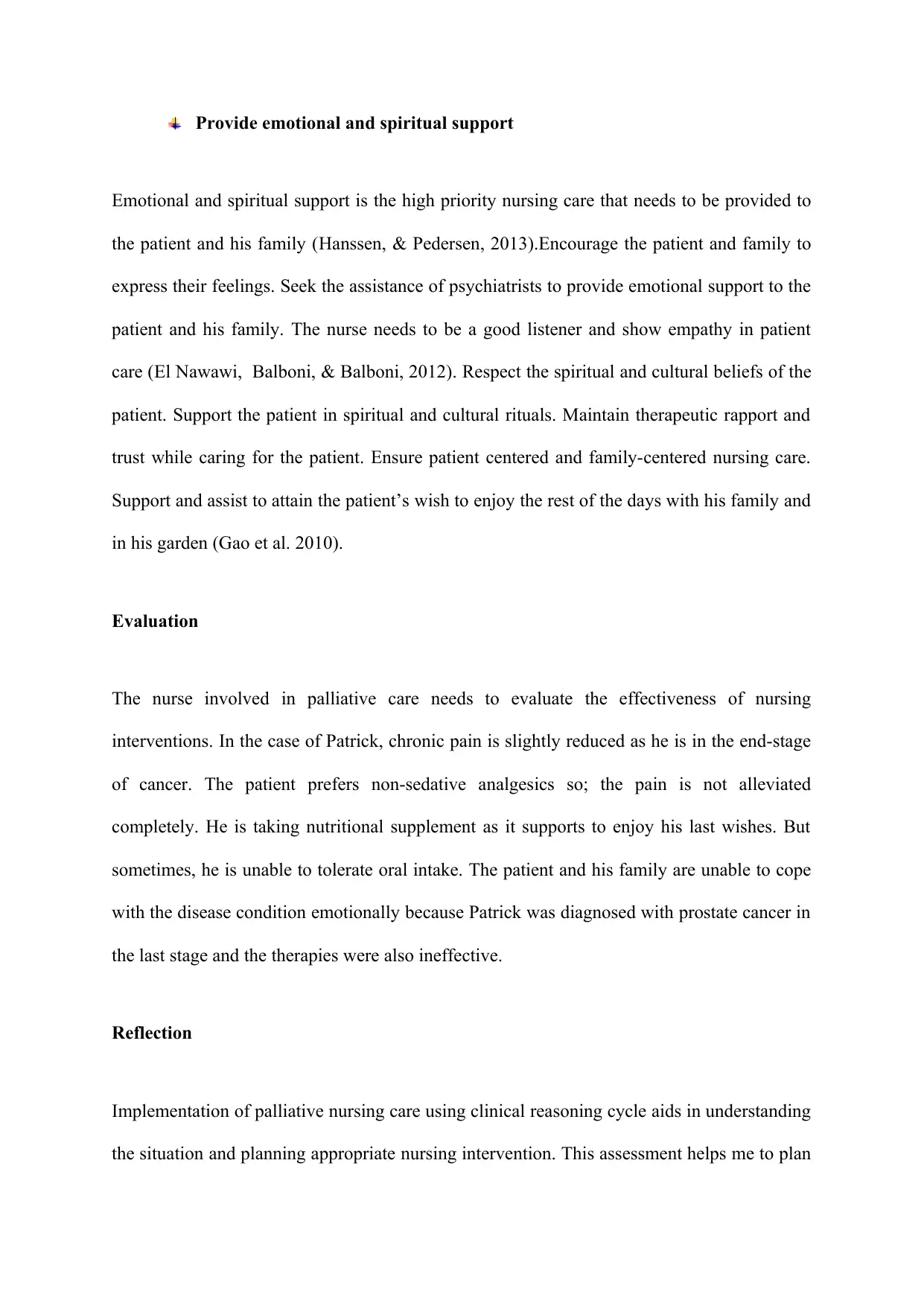
Provide emotional and spiritual support
Emotional and spiritual support is the high priority nursing care that needs to be provided to
the patient and his family (Hanssen, & Pedersen, 2013).Encourage the patient and family to
express their feelings. Seek the assistance of psychiatrists to provide emotional support to the
patient and his family. The nurse needs to be a good listener and show empathy in patient
care (El Nawawi, Balboni, & Balboni, 2012). Respect the spiritual and cultural beliefs of the
patient. Support the patient in spiritual and cultural rituals. Maintain therapeutic rapport and
trust while caring for the patient. Ensure patient centered and family-centered nursing care.
Support and assist to attain the patient’s wish to enjoy the rest of the days with his family and
in his garden (Gao et al. 2010).
Evaluation
The nurse involved in palliative care needs to evaluate the effectiveness of nursing
interventions. In the case of Patrick, chronic pain is slightly reduced as he is in the end-stage
of cancer. The patient prefers non-sedative analgesics so; the pain is not alleviated
completely. He is taking nutritional supplement as it supports to enjoy his last wishes. But
sometimes, he is unable to tolerate oral intake. The patient and his family are unable to cope
with the disease condition emotionally because Patrick was diagnosed with prostate cancer in
the last stage and the therapies were also ineffective.
Reflection
Implementation of palliative nursing care using clinical reasoning cycle aids in understanding
the situation and planning appropriate nursing intervention. This assessment helps me to plan
Emotional and spiritual support is the high priority nursing care that needs to be provided to
the patient and his family (Hanssen, & Pedersen, 2013).Encourage the patient and family to
express their feelings. Seek the assistance of psychiatrists to provide emotional support to the
patient and his family. The nurse needs to be a good listener and show empathy in patient
care (El Nawawi, Balboni, & Balboni, 2012). Respect the spiritual and cultural beliefs of the
patient. Support the patient in spiritual and cultural rituals. Maintain therapeutic rapport and
trust while caring for the patient. Ensure patient centered and family-centered nursing care.
Support and assist to attain the patient’s wish to enjoy the rest of the days with his family and
in his garden (Gao et al. 2010).
Evaluation
The nurse involved in palliative care needs to evaluate the effectiveness of nursing
interventions. In the case of Patrick, chronic pain is slightly reduced as he is in the end-stage
of cancer. The patient prefers non-sedative analgesics so; the pain is not alleviated
completely. He is taking nutritional supplement as it supports to enjoy his last wishes. But
sometimes, he is unable to tolerate oral intake. The patient and his family are unable to cope
with the disease condition emotionally because Patrick was diagnosed with prostate cancer in
the last stage and the therapies were also ineffective.
Reflection
Implementation of palliative nursing care using clinical reasoning cycle aids in understanding
the situation and planning appropriate nursing intervention. This assessment helps me to plan
⊘ This is a preview!⊘
Do you want full access?
Subscribe today to unlock all pages.

Trusted by 1+ million students worldwide
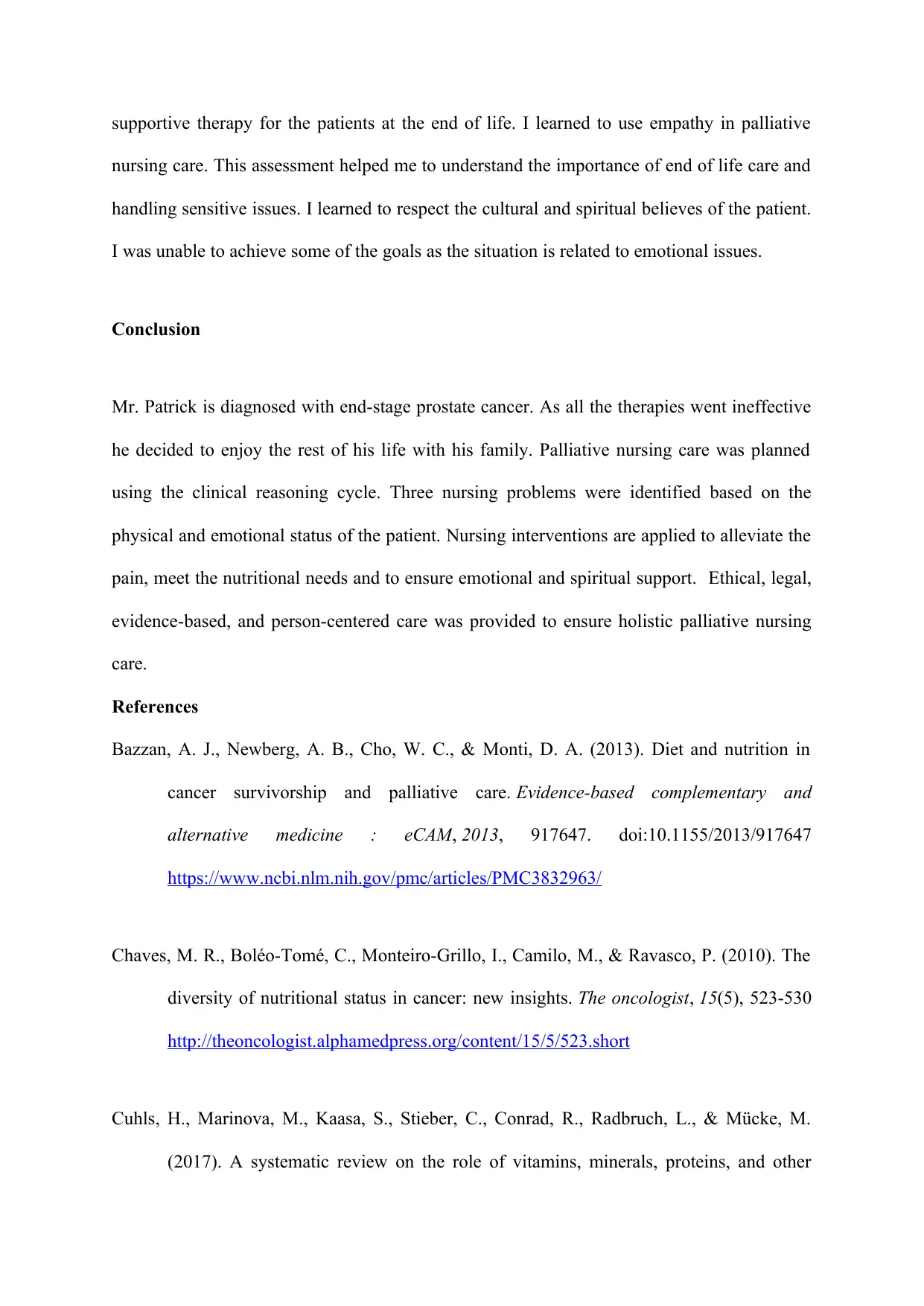
supportive therapy for the patients at the end of life. I learned to use empathy in palliative
nursing care. This assessment helped me to understand the importance of end of life care and
handling sensitive issues. I learned to respect the cultural and spiritual believes of the patient.
I was unable to achieve some of the goals as the situation is related to emotional issues.
Conclusion
Mr. Patrick is diagnosed with end-stage prostate cancer. As all the therapies went ineffective
he decided to enjoy the rest of his life with his family. Palliative nursing care was planned
using the clinical reasoning cycle. Three nursing problems were identified based on the
physical and emotional status of the patient. Nursing interventions are applied to alleviate the
pain, meet the nutritional needs and to ensure emotional and spiritual support. Ethical, legal,
evidence-based, and person-centered care was provided to ensure holistic palliative nursing
care.
References
Bazzan, A. J., Newberg, A. B., Cho, W. C., & Monti, D. A. (2013). Diet and nutrition in
cancer survivorship and palliative care. Evidence-based complementary and
alternative medicine : eCAM, 2013, 917647. doi:10.1155/2013/917647
https://www.ncbi.nlm.nih.gov/pmc/articles/PMC3832963/
Chaves, M. R., Boléo-Tomé, C., Monteiro-Grillo, I., Camilo, M., & Ravasco, P. (2010). The
diversity of nutritional status in cancer: new insights. The oncologist, 15(5), 523-530
http://theoncologist.alphamedpress.org/content/15/5/523.short
Cuhls, H., Marinova, M., Kaasa, S., Stieber, C., Conrad, R., Radbruch, L., & Mücke, M.
(2017). A systematic review on the role of vitamins, minerals, proteins, and other
nursing care. This assessment helped me to understand the importance of end of life care and
handling sensitive issues. I learned to respect the cultural and spiritual believes of the patient.
I was unable to achieve some of the goals as the situation is related to emotional issues.
Conclusion
Mr. Patrick is diagnosed with end-stage prostate cancer. As all the therapies went ineffective
he decided to enjoy the rest of his life with his family. Palliative nursing care was planned
using the clinical reasoning cycle. Three nursing problems were identified based on the
physical and emotional status of the patient. Nursing interventions are applied to alleviate the
pain, meet the nutritional needs and to ensure emotional and spiritual support. Ethical, legal,
evidence-based, and person-centered care was provided to ensure holistic palliative nursing
care.
References
Bazzan, A. J., Newberg, A. B., Cho, W. C., & Monti, D. A. (2013). Diet and nutrition in
cancer survivorship and palliative care. Evidence-based complementary and
alternative medicine : eCAM, 2013, 917647. doi:10.1155/2013/917647
https://www.ncbi.nlm.nih.gov/pmc/articles/PMC3832963/
Chaves, M. R., Boléo-Tomé, C., Monteiro-Grillo, I., Camilo, M., & Ravasco, P. (2010). The
diversity of nutritional status in cancer: new insights. The oncologist, 15(5), 523-530
http://theoncologist.alphamedpress.org/content/15/5/523.short
Cuhls, H., Marinova, M., Kaasa, S., Stieber, C., Conrad, R., Radbruch, L., & Mücke, M.
(2017). A systematic review on the role of vitamins, minerals, proteins, and other
Paraphrase This Document
Need a fresh take? Get an instant paraphrase of this document with our AI Paraphraser
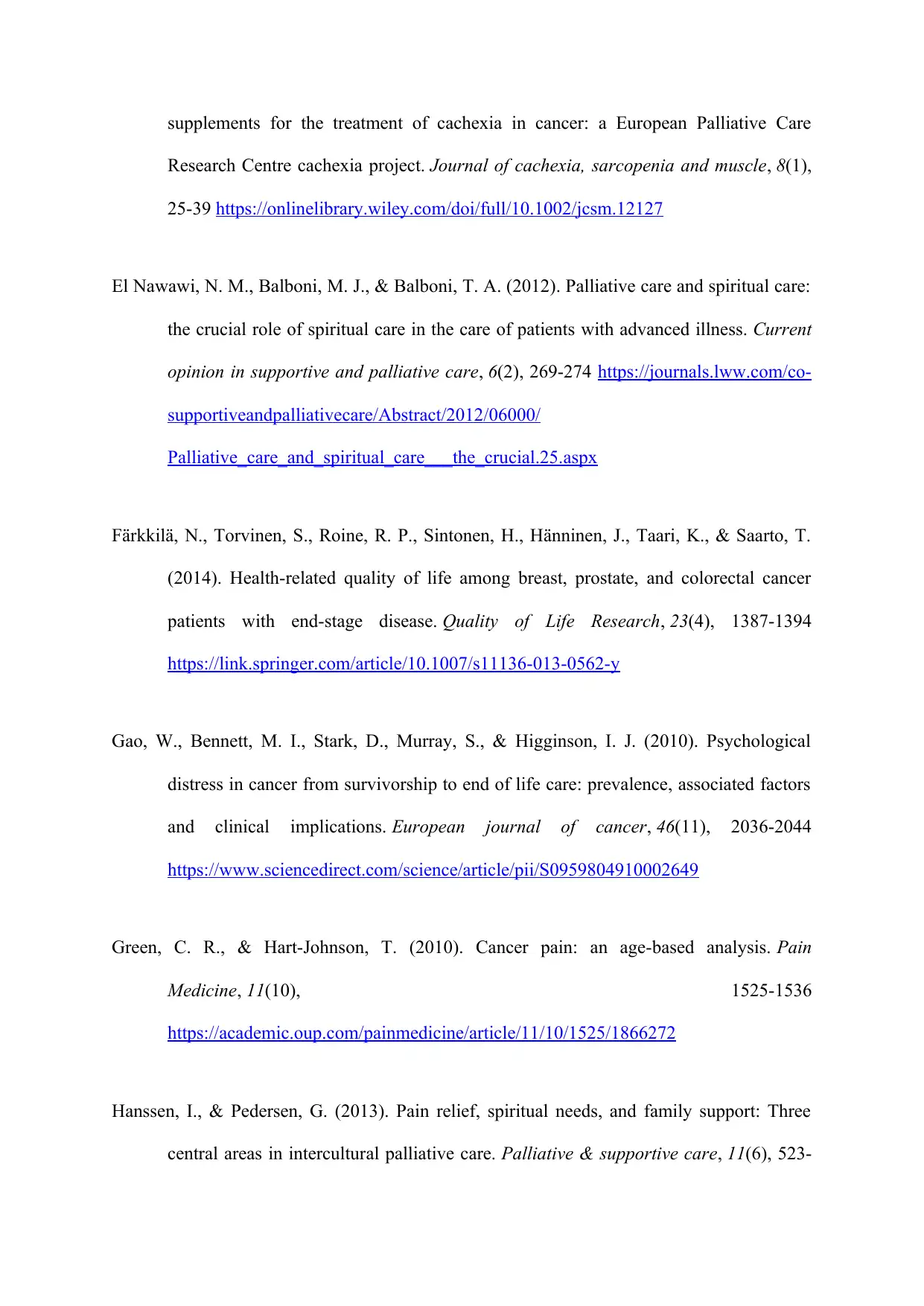
supplements for the treatment of cachexia in cancer: a European Palliative Care
Research Centre cachexia project. Journal of cachexia, sarcopenia and muscle, 8(1),
25-39 https://onlinelibrary.wiley.com/doi/full/10.1002/jcsm.12127
El Nawawi, N. M., Balboni, M. J., & Balboni, T. A. (2012). Palliative care and spiritual care:
the crucial role of spiritual care in the care of patients with advanced illness. Current
opinion in supportive and palliative care, 6(2), 269-274 https://journals.lww.com/co-
supportiveandpalliativecare/Abstract/2012/06000/
Palliative_care_and_spiritual_care___the_crucial.25.aspx
Färkkilä, N., Torvinen, S., Roine, R. P., Sintonen, H., Hänninen, J., Taari, K., & Saarto, T.
(2014). Health-related quality of life among breast, prostate, and colorectal cancer
patients with end-stage disease. Quality of Life Research, 23(4), 1387-1394
https://link.springer.com/article/10.1007/s11136-013-0562-y
Gao, W., Bennett, M. I., Stark, D., Murray, S., & Higginson, I. J. (2010). Psychological
distress in cancer from survivorship to end of life care: prevalence, associated factors
and clinical implications. European journal of cancer, 46(11), 2036-2044
https://www.sciencedirect.com/science/article/pii/S0959804910002649
Green, C. R., & Hart-Johnson, T. (2010). Cancer pain: an age-based analysis. Pain
Medicine, 11(10), 1525-1536
https://academic.oup.com/painmedicine/article/11/10/1525/1866272
Hanssen, I., & Pedersen, G. (2013). Pain relief, spiritual needs, and family support: Three
central areas in intercultural palliative care. Palliative & supportive care, 11(6), 523-
Research Centre cachexia project. Journal of cachexia, sarcopenia and muscle, 8(1),
25-39 https://onlinelibrary.wiley.com/doi/full/10.1002/jcsm.12127
El Nawawi, N. M., Balboni, M. J., & Balboni, T. A. (2012). Palliative care and spiritual care:
the crucial role of spiritual care in the care of patients with advanced illness. Current
opinion in supportive and palliative care, 6(2), 269-274 https://journals.lww.com/co-
supportiveandpalliativecare/Abstract/2012/06000/
Palliative_care_and_spiritual_care___the_crucial.25.aspx
Färkkilä, N., Torvinen, S., Roine, R. P., Sintonen, H., Hänninen, J., Taari, K., & Saarto, T.
(2014). Health-related quality of life among breast, prostate, and colorectal cancer
patients with end-stage disease. Quality of Life Research, 23(4), 1387-1394
https://link.springer.com/article/10.1007/s11136-013-0562-y
Gao, W., Bennett, M. I., Stark, D., Murray, S., & Higginson, I. J. (2010). Psychological
distress in cancer from survivorship to end of life care: prevalence, associated factors
and clinical implications. European journal of cancer, 46(11), 2036-2044
https://www.sciencedirect.com/science/article/pii/S0959804910002649
Green, C. R., & Hart-Johnson, T. (2010). Cancer pain: an age-based analysis. Pain
Medicine, 11(10), 1525-1536
https://academic.oup.com/painmedicine/article/11/10/1525/1866272
Hanssen, I., & Pedersen, G. (2013). Pain relief, spiritual needs, and family support: Three
central areas in intercultural palliative care. Palliative & supportive care, 11(6), 523-
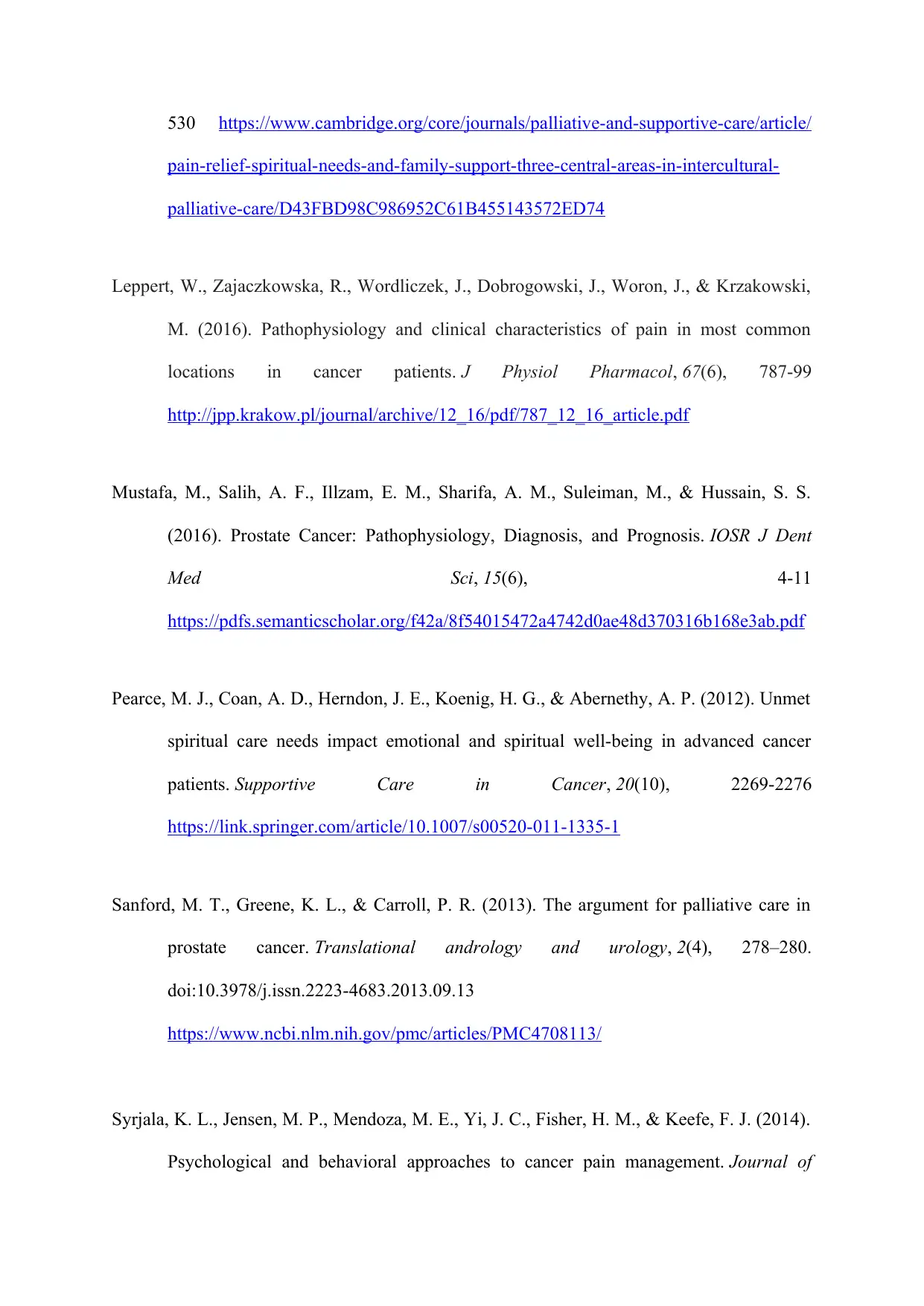
530 https://www.cambridge.org/core/journals/palliative-and-supportive-care/article/
pain-relief-spiritual-needs-and-family-support-three-central-areas-in-intercultural-
palliative-care/D43FBD98C986952C61B455143572ED74
Leppert, W., Zajaczkowska, R., Wordliczek, J., Dobrogowski, J., Woron, J., & Krzakowski,
M. (2016). Pathophysiology and clinical characteristics of pain in most common
locations in cancer patients. J Physiol Pharmacol, 67(6), 787-99
http://jpp.krakow.pl/journal/archive/12_16/pdf/787_12_16_article.pdf
Mustafa, M., Salih, A. F., Illzam, E. M., Sharifa, A. M., Suleiman, M., & Hussain, S. S.
(2016). Prostate Cancer: Pathophysiology, Diagnosis, and Prognosis. IOSR J Dent
Med Sci, 15(6), 4-11
https://pdfs.semanticscholar.org/f42a/8f54015472a4742d0ae48d370316b168e3ab.pdf
Pearce, M. J., Coan, A. D., Herndon, J. E., Koenig, H. G., & Abernethy, A. P. (2012). Unmet
spiritual care needs impact emotional and spiritual well-being in advanced cancer
patients. Supportive Care in Cancer, 20(10), 2269-2276
https://link.springer.com/article/10.1007/s00520-011-1335-1
Sanford, M. T., Greene, K. L., & Carroll, P. R. (2013). The argument for palliative care in
prostate cancer. Translational andrology and urology, 2(4), 278–280.
doi:10.3978/j.issn.2223-4683.2013.09.13
https://www.ncbi.nlm.nih.gov/pmc/articles/PMC4708113/
Syrjala, K. L., Jensen, M. P., Mendoza, M. E., Yi, J. C., Fisher, H. M., & Keefe, F. J. (2014).
Psychological and behavioral approaches to cancer pain management. Journal of
pain-relief-spiritual-needs-and-family-support-three-central-areas-in-intercultural-
palliative-care/D43FBD98C986952C61B455143572ED74
Leppert, W., Zajaczkowska, R., Wordliczek, J., Dobrogowski, J., Woron, J., & Krzakowski,
M. (2016). Pathophysiology and clinical characteristics of pain in most common
locations in cancer patients. J Physiol Pharmacol, 67(6), 787-99
http://jpp.krakow.pl/journal/archive/12_16/pdf/787_12_16_article.pdf
Mustafa, M., Salih, A. F., Illzam, E. M., Sharifa, A. M., Suleiman, M., & Hussain, S. S.
(2016). Prostate Cancer: Pathophysiology, Diagnosis, and Prognosis. IOSR J Dent
Med Sci, 15(6), 4-11
https://pdfs.semanticscholar.org/f42a/8f54015472a4742d0ae48d370316b168e3ab.pdf
Pearce, M. J., Coan, A. D., Herndon, J. E., Koenig, H. G., & Abernethy, A. P. (2012). Unmet
spiritual care needs impact emotional and spiritual well-being in advanced cancer
patients. Supportive Care in Cancer, 20(10), 2269-2276
https://link.springer.com/article/10.1007/s00520-011-1335-1
Sanford, M. T., Greene, K. L., & Carroll, P. R. (2013). The argument for palliative care in
prostate cancer. Translational andrology and urology, 2(4), 278–280.
doi:10.3978/j.issn.2223-4683.2013.09.13
https://www.ncbi.nlm.nih.gov/pmc/articles/PMC4708113/
Syrjala, K. L., Jensen, M. P., Mendoza, M. E., Yi, J. C., Fisher, H. M., & Keefe, F. J. (2014).
Psychological and behavioral approaches to cancer pain management. Journal of
⊘ This is a preview!⊘
Do you want full access?
Subscribe today to unlock all pages.

Trusted by 1+ million students worldwide

Clinical Oncology, 32(16), 1703
https://www.ncbi.nlm.nih.gov/pmc/articles/PMC4031190/
Zimmermann, C., Swami, N., Krzyzanowska, M., Hannon, B., Leighl, N., Oza, A., ... &
Donner, A. (2014). Early palliative care for patients with advanced cancer: a cluster-
randomised controlled trial. The Lancet, 383(9930), 1721-1730
https://www.sciencedirect.com/science/article/pii/S0140673613624162
https://www.ncbi.nlm.nih.gov/pmc/articles/PMC4031190/
Zimmermann, C., Swami, N., Krzyzanowska, M., Hannon, B., Leighl, N., Oza, A., ... &
Donner, A. (2014). Early palliative care for patients with advanced cancer: a cluster-
randomised controlled trial. The Lancet, 383(9930), 1721-1730
https://www.sciencedirect.com/science/article/pii/S0140673613624162
1 out of 10
Related Documents
Your All-in-One AI-Powered Toolkit for Academic Success.
+13062052269
info@desklib.com
Available 24*7 on WhatsApp / Email
![[object Object]](/_next/static/media/star-bottom.7253800d.svg)
Unlock your academic potential
Copyright © 2020–2026 A2Z Services. All Rights Reserved. Developed and managed by ZUCOL.





